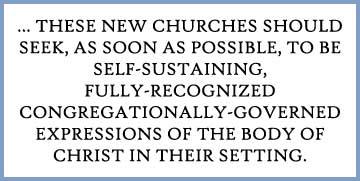Understanding Global Partnerships
This desire to go global has resulted in an expansive Brethren presence. We can and should celebrate the scope of our world-wide mission in relation to the size of our national church. We also celebrate the work of so many who have faithfully gone overseas on our behalf to proclaim the Good News. It is wonderful that God has used the Brethren Church for Kingdom impact in nine countries outside North America! In addition to our denominational partnerships, we must celebrate the many mission connections all over the world that have been embraced by individual congregations. We praise God for the enormous scope of Brethren missions!
What might escape our notice, however, are the winds of change that have been blowing for some time in regard to foreign missions in many other denominations, and are now catching up with the Brethren Church as well. Change is sometimes difficult and often feels disorganized. It is one thing to launch an entirely new endeavor from a new paradigm, but it is a more difficult challenge to transition from one set of understandings to another. This sort of transition and change in our Brethren understanding of missions is difficult for both the sending group and those who have come to depend on the support of others.of our world-wide mission in relation to the size of our national church. We also celebrate the work of so many who have faithfully gone overseas on our behalf to proclaim the Good News. It is wonderful that God has used the Brethren Church for Kingdom impact in nine countries outside North America! In addition to our denominational partnerships, we must celebrate the many mission connections all over the world that have been embraced by individual congregations. We praise God for the enormous scope of Brethren missions!
Understanding healthy and effective cross-cultural partnerships is an ongoing process. We nonetheless need to embrace those understandings and practices that best express a fruitful relationship with each other and with God. We are currently experiencing a time of reflection on past missions efforts, where the health of our partnerships is being assessed. We have asked some of our Global Partners about areas where we sought to do well, but perhaps in doing good might also have created barriers. We have reviewed some of the best of what is being written concerning this subject. We have consulted with others who have served abroad in the past or are supervising such efforts now. The result of all this is that we have embraced new ideas and adopted practices that will strengthen our relationships and our respective abilities to work together more effectively.
With these things in mind, it is helpful for us to consider some newer understandings that are reshaping our relationships in regard to Global Partners.
1. We understand that foreign missions are essentially a cross-cultural effort to establish new churches. Therefore these new churches should seek, as soon as possible, to be self-sustaining, fully-recognized, congregationally-governed expressions of the Body of Christ in their setting.
2. We understand that North American missionaries will likely continue to be deployed, resulting in the establishment of new churches who must themselves discern God’s future in their own context. Therefore deployment should always be made with a specific exit strategy. This would result in the North American missionaries return to their home country, or being redeployed to work alongside indigenous leaders at their request. A non-resident missionary model could also be employed, where periodic short-term “missionary” visits result in a fully indigenous church from the very beginning.
3. We understand that it is unwise to allocate resources without healthy supervision. It is also diffi cult to supervise properly from a long distance compounded by myriad cultural differences and understandings. We therefore understand that each new indigenous partner should seek to be self-sustaining at the earliest possible time. This allows for local supervision according to local understandings. Progress toward financial sustainability means outside support and supervision can gradually be transitioned from day to day operations, to helping with visionary expansion. Freedom from outside supervision often eliminates a potential barrier to growth. U.S. funds are now available to be redirected to the next mission endeavor. Ken Hunn
4. It seems reasonable to understand that those sent from the United States to other countries for the purpose of Kingdom impact should be considered “our missionaries.” It is also imperative that we see indigenous leaders and followers of Christ to be equal partners in the gospel. These leaders should be encouraged to take their place in a global effort for that same Kingdom impact. For this reason we use the term “Global Partners,” in an effort to communicate both the equality of and necessity of their partnership in the global work of the gospel.
5. Where there are conditions of human suffering due to natural disaster, poverty, or injustice, we understand our responsibility to address this need is a focus of Brethren Relief. Funds for this imperative should be given by all Global Partners. The focus of these gifts would be to alleviate present suffering, rehabilitate to a condition of stability, and develop individuals to sustainability and their fullest potential.











